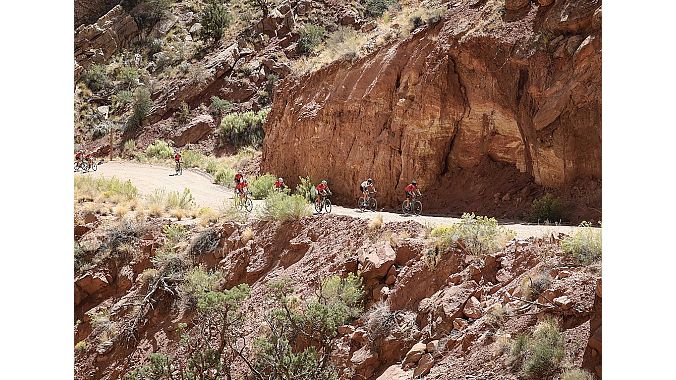BOULDER, Colo. (BRAIN) — President Trump's proclamation Monday shrinking two National Monuments in Utah jeopardizes at least 150 miles of roads and trails used by cyclists and could lead to the loss of protection for much more cycling terrain around the country, according to PeopleForBikes.
"The President's attack on our public lands puts 150 miles of pristine bike riding at risk," said Tim Blumenthal, the president of PeopleForBikes. "We will continue to fight tooth and nail alongside our partners to keep this land as national monuments."
Native American groups and conservation groups immediately launched court challenges to Trump's proclamation, which has been expected for several months. Meanwhile, Republican lawmakers are working on legislation that would determine the future of the lands.
"There are still 25 more monuments to review. It's a pretty terrible start." — Alex Lagemann, PeopleForBikes
As for the 150 miles Blumenthal was referring to, he meant roads and trails in areas protected by monument status before Trump's proclamation but which would lose that protection if Trump's move is upheld. The roads — the Burr Trail, Lockhart Basin and Elk Ridge — are in Grand Staircase-Escalante National Monument and Bears Ears National Monument. Both monuments were greatly reduced in size by Trump's proclamation.
The remote areas don't see a lot of cycling use now, although Lockhart Basin contains some mountain bike trails and for years oil and gas companies have been eyeing that area in particular for drilling. Monument status put the areas on the map for many outdoor recreationalists, including cyclists, and that could lead to more visits and tourism development in nearby communities. Some groups say that kind of development would be more stable and profitable than resource extraction, besides the benefits of preservation.

Before gaining monument status, most or all of the land was owned by the federal government and managed by the Bureau of Land Management or the National Forest Service.
"The BLM and the Forest Service operate under a multiuse mandate, which could include oil and gas drilling, timbering, mining and lot of other options. Monuments are much more limited," said Alex Logemann, PeopleForBikes' director of state and local policy.
Logemann said the larger concern after Trump's announcement is that he will call for the removal of protections from other monuments. In April, Trump told the Department of the Interior to review 27 monuments; his proclamation Monday only involved two of them.
"One of the things that's so alarming about the action he took on these two monuments is that he started out with such a dramatic land reduction. There are still 25 more monuments to review. It's a pretty terrible start," said Logemann.
Many outdoor groups and outdoor industry suppliers are working to challenge Trump's proclamation in the courts. Companies like Patagonia, The North Face, REI and Arc'teryx are bringing public attention to the issue and raising money for the legal fight.
PeopleForBikes is focusing its opposition efforts on lobbying Congress and keeping cyclists and the industry informed, Logemann said.
Utah's U.S. Rep. John Curtis has sponsored legislation that would codify Trump's proclamation as law. Curtis said his legislation would add law enforcement to what is left of Bears Ears National Monument, forbid oil and gas drilling and mining in the region and give tribes a role in managing the lands. Logemann said PeopleForBikes will focus on influencing that legislation and encouraging public input.
After Trump's April order calling for the review, PeopleForBikes worked with other groups to encourage public comments. During the comment period, 2.7 million people contacted the Department of the Interior, with 98 percent of comments supporting existing national monuments.



